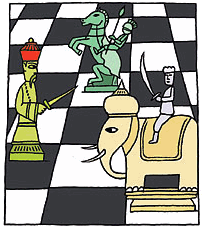


 The
Indian Defense
The
Indian DefenseWhere did chess begin? When Viswanathan Anand, guest essayist in TIME Magazine, was confronted by Russian grandmasters in 1991 in Reggio Emilia, who told him he could at best be a coffee-house player, because he had not been tutored in the Soviet school of chess, he thought to himself, "But didn't we Indians invent chess? Why shouldn't I have my own route to the top of the sport?"
Seventeen years later the reigning World Champion and number one in the world rankings, say he's heard the ownership of chess being claimed by Russians, Chinese, Ukrainians, Arabs, Iranians, Turks, Spaniards and Greeks. "My own view is that the sport belongs to everybody who plays it, but the question of its origins is easy enough to answer: chess comes from India. "
His claim, he says, is based not on dominance, "although the Indian school is now producing lots of high-quality players, including (ahem) the world No. 1." He sites some of the oldest references to the sport, which are to be found in ancient Indian texts. For instance in the great epic Ramayana, which was orally transmitted sometime between 750 B.C. and 500 B.C. In it the demon king Ravana invents chess to amuse his wife Mandodari, who promptly beats him at it. "My grandmother told me that story when I first began to play the game at age 6," Anand writes. He also notes that there is mention of a game of war strategy, known as chaturanga, played on an 8-by-8 board, in Arthashastra from the 3rd century B.C.
Anand describes how chess traveled westward out of India, through Afghanistan into Persia, where the game became known as chatrang. The Arabs called it shatranj and learnt it when they conquered Persia in the 6th century A.D. They introduced the game to Europe when the Moors crossed the Mediterranean into the Iberian peninsula."
For anyone interested in the history of the game Anand's essay is a must. We are somewhat surprised by the references found in such ancient books. Perhaps chess historians will weigh in on the subject. We know there were early precursors – game pieces have been uncovered in countless archaeological digs – but they came from other hardly related board games. We are interested in the origin of chess as a game defined by certain essential characteristics, i.e. the 8x8 checkered board, different pieces types having different powers, and victory depended on the fate of one piece, the king of modern chess.
"I like to think that the arc of my own career has in some ways mirrored the journey of chess," writes Anand. "I learned to play in India, then moved to Spain so I could play the European circuit, and won my first world championship in Iran. It's nice when your place in chess history has something to do with the bigger picture."